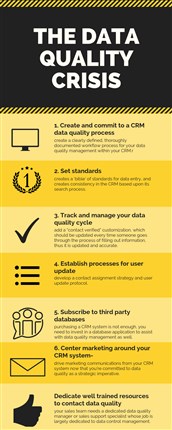 By Lauren Fenthum
By Lauren Fenthum<---- To view/save infographic
CLICK HERE
There is an overwhelming amount of data available to us, through every type of industry and through everyday interactions. But with such abundance, comes the issue of quality control. Companies rely heavily on data to drive strategy, but this intelligence is operated on inaccurate and stale data, which could be devastating to the company if the data is misrepresented. Generating quality data takes time, which most companies feel they simply just do not have. Instead of investing in the generation of quality data, most companies opt to stick with the same routine, thus missing sales and marketing opportunities.
For a piece of mind how bad the current state of data is, consider this:
A company has connected to over 200 CRM and marketing automation platforms, of that, they found that 33% of the data that they had collected from their clients was useless due to inaccurate, outdated, or missing data. Ultimately this could lead to the rapid decay of the business. Recent studies have also shown that within a 3-month period, 7.6% of contacts within the average CRM database become unreachable, with 4.2% of phone numbers changing and 2.5% of emails becoming invalid. This is a lot of missed data and wasted opportunities that is costing your business money! The dynamic nature of data and businesses sided with inadequate solutions can be seen as the foundational problem of this crisis.
Poor data quality is the Trojan horse of CRM, and losing accuracy means losing effectiveness. Thus when implementing a CRM system it is imperative that you don't only train front line employees to use the software but maybe 1 or 2 people to master it and maintain it at all times, but not just maintaining the system but ensuring that the data is up to date and useable. In order to maintain and generate quality data, there are a few steps you can follow to ensure that you don't run the risk of losing contacts at the end of every year:
- Create and commit to a CRM data quality process- Create a clearly defined, thoroughly documented workflow process for your data quality management within your CRM.
- Set standards- Creates a ‘bible’ of standards for data entry, and creates consistency in the CRM based upon its search process.
- Track and manage your data quality cycle - Add a “contact verified” customization, which should be updated every time someone goes through the process of filling out information, thus it is updated and accurate.
- Establish processes for user updates - Develop a contact assignment strategy and user update protocol.
- Subscribe to third-party databases - Purchasing a CRM system is not enough, you need to invest in a database application to assist with data quality management as well.
- Center marketing around your CRM system - Drive marketing communications from your CRM system now that you’re committed to data quality as a strategic imperative.
- Dedicate well-trained resources to contact data quality - Your sales team needs a dedicated data quality manager or sales support specialist whose job is largely dedicated to data control management.
![]()